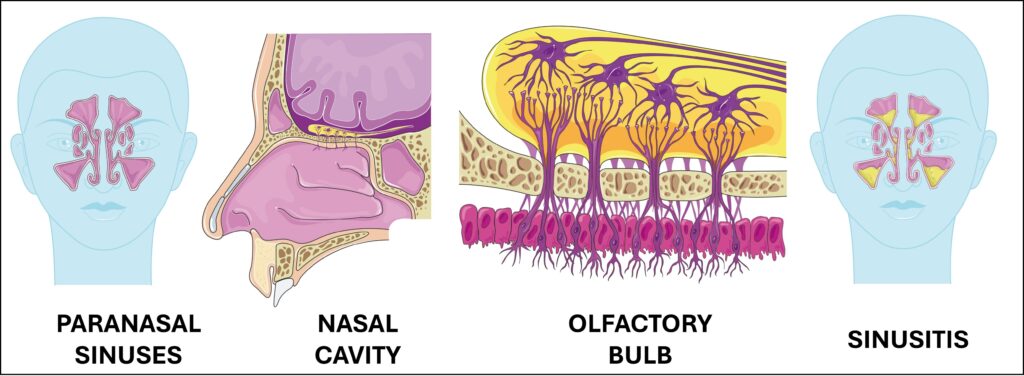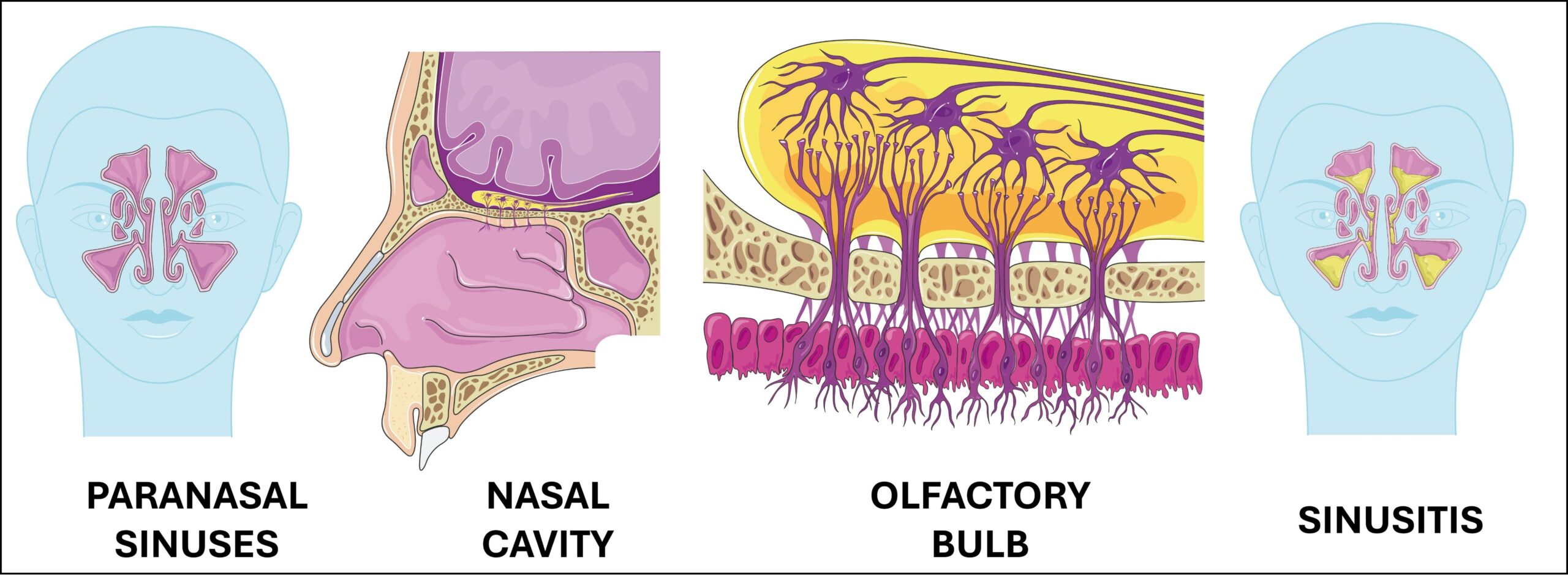Table of Contents

Attribution 4.0 Unported License (https://creativecommons.org/licenses/by/4.0/)
Introduction
Sinus health is a topic often overlooked until issues like congestion, sneezing, or sinus infections arise. While sneezing is a common bodily reflex, it is also an indicator of sinus-related issues. For many, sneezing can be the start of a chain reaction, leading to more severe sinus problems such as inflammation, infections, or even chronic sinusitis. In this article, we will explore the connection between sinus health and sneezing, the mechanisms that trigger sneezing chain reactions, how these conditions form, and best practices for maintaining healthy sinuses.
Understanding the science behind sneezing and sinus reactions helps empower individuals to take proactive steps in maintaining their sinus health. By doing so, we can prevent discomfort, alleviate allergies, and reduce the frequency of infections.
The Science Behind Sneezing: A Reflex with Purpose
What is Sneezing?
Sneezing, also known as “sternutation,” is an involuntary action the body performs when the nasal passages detect irritants such as dust, pollen, or pathogens. It is a defensive reflex designed to expel these irritants from the respiratory system, preventing them from entering the lungs.
When a sneeze is triggered, the body undergoes a coordinated effort involving the brain, respiratory muscles, and the sinus passages. The diaphragm contracts, and the throat closes momentarily, building pressure until it is released in a powerful burst of air that propels irritants out of the body at speeds of up to 100 miles per hour. Though often considered a mere nuisance, sneezing plays a vital role in protecting the respiratory system from harmful substances.
The Role of the Sinuses in Sneezing
Sinus Anatomy and Function
The sinuses are air-filled cavities located behind the forehead, cheeks, eyes, and nose. These spaces play a crucial role in producing mucus that lines the nasal passages, traps debris, and humidifies the air we breathe. There are four pairs of sinuses in the human body listed below.
- Maxillary sinuses (located in the cheekbones)
- Frontal sinuses (located in the forehead)
- Ethmoid sinuses (located between the eyes)
- Sphenoid sinuses (located behind the nose)
Each of these sinuses is connected to the nasal cavity and works in tandem to maintain respiratory health. When healthy, the sinuses remain clear and mucus drains properly. However, when inflamed, congested, or infected, the sinuses can become breeding grounds for bacteria, leading to discomfort and sneezing episodes.
How Sinuses Influence Sneezing
The lining of the sinuses is filled with nerve endings that are hypersensitive to environmental irritants. When an allergen or pathogen enters the nasal passages, the sinuses become irritated, triggering a sneezing reflex. The sinus cavities, acting as filters, release excess mucus to flush out irritants, which in turn stimulates sneezing.
For some individuals, a single sneeze is all it takes to clear the nasal passages. However, for others, especially those with allergies or sinusitis, sneezing can become part of a chain reaction, setting off multiple sneezing episodes in quick succession.
Understanding Sneezing Chain Reactions: Why One Sneeze Becomes Many
The Sensitization of the Sinuses
A sneezing chain reaction occurs when the nasal passages and sinuses become overly sensitive to external stimuli. This sensitization is often due to following reasons.
- Allergic reactions: Allergens like pollen, pet dander, mold, and dust can cause the sinuses to overreact, leading to multiple sneezes.
- Infections: Sinus infections, including the common cold or flu, can inflame the sinus lining, resulting in repetitive sneezing.
- Chronic sinusitis: When sinusitis becomes chronic, the sinuses remain inflamed for long periods, causing frequent sneezing episodes.
These triggers activate the “sneeze center” in the brain, which coordinates the body’s muscular response to expel the irritant. In cases of heightened sensitivity, the sneeze center may remain activated, leading to repeated sneezing in quick succession.
The Impact of Environmental Factors
Environmental factors also play a role in sneezing chain reactions. Individuals living in areas with high pollution levels or heavy pollen counts are more likely to experience sneezing fits. Similarly, sudden changes in temperature or humidity can irritate the nasal passages and sinuses, triggering a sneeze.
Indoor environments can also contribute to sneezing chain reactions, especially in spaces with poor ventilation or high levels of dust and mold. Maintaining clean indoor air quality is essential for preventing sinus irritation and sneezing.
Sinus Health Conditions Linked to Sneezing
Acute Sinusitis
Acute sinusitis is the most common form of sinus inflammation, often caused by viral infections like the cold or flu. Symptoms include nasal congestion, facial pain, and sneezing. This condition typically lasts for a few weeks and can be treated with over-the-counter medications, rest, and nasal irrigation.
Chronic Sinusitis
Chronic sinusitis occurs when sinus inflammation persists for 12 weeks or longer. This condition is often the result of repeated infections or long-term exposure to allergens. Individuals with chronic sinusitis may experience frequent sneezing fits, facial pressure, and difficulty breathing through the nose. Treatment for chronic sinusitis may involve prescription medications, nasal corticosteroids, or, in severe cases, surgery to drain the sinuses.
Allergic Rhinitis (Hay Fever)
Allergic rhinitis is an allergic reaction that occurs when the immune system overreacts to allergens like pollen or pet dander. This condition causes inflammation of the nasal passages and sinuses, leading to sneezing, runny nose, and itchy eyes. Individuals with allergic rhinitis often experience sneezing chain reactions, particularly during allergy season.
Nasal Polyps
Nasal polyps are noncancerous growths that form in the sinuses due to chronic inflammation. While they are painless, nasal polyps can block the nasal passages, leading to congestion, frequent sneezing, and sinus infections. Treatment options for nasal polyps include medications to shrink the polyps or surgical removal in severe cases.
Caring for Your Sinuses: Prevention and Treatment
1. Keep Allergens at Bay
Since allergens are a primary trigger for sneezing and sinus inflammation, managing exposure is key to sinus health. Consider the following tips:
- Use air purifiers in your home to reduce airborne allergens.
- Wash your bedding regularly to remove dust mites and pet dander.
- Keep windows closed during high pollen seasons and shower after outdoor activities.
2. Stay Hydrated
Drinking plenty of water helps thin the mucus in your sinuses, allowing it to drain more effectively. Herbal teas and clear broths are also great options for maintaining hydration and soothing irritated sinuses.
3. Use Nasal Irrigation
Nasal irrigation is an effective way to clear the sinuses of mucus and debris. A saline solution can be used with a neti pot or squeeze bottle to flush out the nasal passages, reducing the risk of sinus infections and sneezing chain reactions.
4. Steam Therapy
Inhaling steam can help open up congested sinuses and soothe irritated nasal passages. Simply inhale steam from a bowl of hot water or take a hot shower to reduce sinus pressure and alleviate sneezing.
5. Manage Indoor Air Quality
Maintaining clean indoor air is essential for sinus health. Use HEPA filters in your home to remove dust, pollen, and other irritants from the air. Additionally, consider using a humidifier to keep the air moist, especially during dry seasons.
6. Over-the-Counter Remedies
For those dealing with acute sinusitis or allergies, over-the-counter medications such as antihistamines, decongestants, or nasal sprays can provide relief. However, these medications should be used under the guidance of a healthcare professional to avoid overuse or dependence.
The Role of Diet in Sinus Health
Anti-Inflammatory Foods
Incorporating anti-inflammatory foods into your diet can reduce sinus inflammation and support overall respiratory health. Some of the best options include:
- Fatty fish like salmon (rich in omega-3 fatty acids)
- Leafy greens such as spinach and kale
- Ginger and turmeric, which have natural anti-inflammatory properties
- Citrus fruits, which are high in vitamin C and support immune function
Avoiding Mucus-Producing Foods
Certain foods can contribute to excess mucus production, leading to sinus congestion and sneezing. These foods include:
- Dairy products like milk and cheese
- Fried and processed foods
- Sugary snacks and beverages
By adopting a diet that prioritizes anti-inflammatory foods and minimizes mucus-producing ones, you can promote better sinus health and reduce the frequency of sneezing chain reactions.
Conclusion
Sneezing is more than just an annoying reflex—it serves an important function in maintaining sinus and respiratory health. However, when sneezing becomes part of a chain reaction or is accompanied by sinus discomfort, it is a sign that something is wrong with the sinuses. By understanding the underlying causes of sneezing chain reactions and implementing sinus care strategies such as hydration, nasal irrigation, and dietary adjustments, individuals can maintain healthier sinuses and reduce the risk of chronic conditions.
Sinus health is a vital aspect of overall wellness, and proper care can prevent not only sneezing fits but also long-term complications like sinusitis. Staying proactive about your sinus health is the key to avoiding discomfort and maintaining a high quality of life.
Frequently Asked Questions (FAQs)
1. What causes sneezing chain reactions?
Sneezing chain reactions are often caused by sinus irritation due to allergens, infections, or chronic sinusitis.
2. Can diet affect sinus health?
Yes, a diet high in anti-inflammatory foods can improve sinus health, while mucus-producing foods can contribute to congestion.
3. How can I prevent frequent sneezing?
Prevent frequent sneezing by managing allergens, staying hydrated, and using nasal irrigation to keep your sinuses clear.
4. What are the symptoms of chronic sinusitis?
Chronic sinusitis symptoms include prolonged nasal congestion, facial pain, and frequent sneezing that lasts more than 12 weeks.
5. Is nasal irrigation safe?
Yes, nasal irrigation is generally safe when done with sterile saline solutions and proper equipment, such as a neti pot.
References
https://www.mdpi.com/2076-2607/12/8/1690
https://www.mdpi.com/2075-4426/13/11/1531
https://www.mdpi.com/2673-351X/1/1/76
https://www.mdpi.com/2673-351X/6/1/3
https://www.mdpi.com/2313-5786/4/1/2
YouTube Linkhttps://youtube.com/shorts/z1hwx-KTZQs?feature=share

